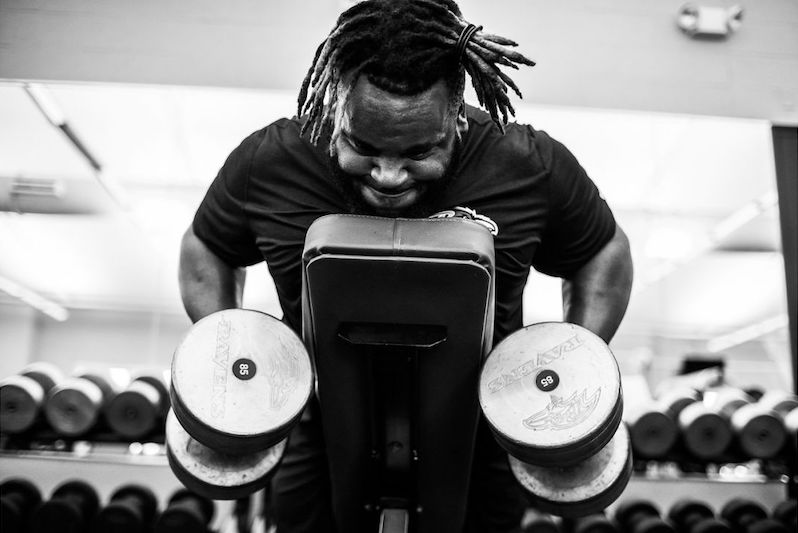Even if you’re not a football player, you’ve at least seen it on TV and you know how explosive, fast, and dynamic it is. If you are a player, not only do you know it, you’ve felt it. Sometimes, it was not very comfortable and it left a bruise or two, maybe even a broken bone. It doesn’t matter if you’re a linebacker that’s charging through the line or a wide receiver sprinting down the field, your best friends are strength and speed. Traditional strength training methods like bench presses and squats definitely have their place in a football player’s regimen, but there’s another contender that deserves just as much attention – Olympic weightlifting.
Okay, we know what you think – isn’t that for the guys who compete in the Olympics? Well, yes and no. Olympic weightlifting is a sport in its own right, that’s true, but its benefits go beyond the competition platform. Way beyond!
We’ve kept you in suspense long enough, so chalk up your hands and get ready for Olympic weightlifting and its benefits!
The Basics of Olympic Weightlifting
The focus here is on two main lifts – the snatch and the clean and jerk. If you think there are your regular run-of-the mill lifts, you have another thing coming because these are actually dynamic movements that combine power, speed, and technique.
The snatch lift looks like this: you approach the barbell, crouch down, and then explode up, lifting the barbell over your head from the ground in one swift motion. To the untrained eye, this looks like it’s just about brute strength, but that couldn’t be further from the truth. Apart from strength, you need coordination, balance, and timing to execute it properly.
Now, onto the clean and jerk. This one is more complex and it’s actually two movements in one, hence the name. First, there’s the clean, where you hoist the barbell to shoulder height in one smooth motion. Then there’s the jerk, where you quickly thrust the barbell over your head, locking out your arms to complete the lift. It’s a test of speed, strength, and precision, so you’ll need both physical prowess and mental focus if you want to master it.
So, what sets Olympic weightlifting apart from the other forms of strength training? Well, in powerlifting, the focus is on max strength in three main lifts – the squat, the bench press, and the deadlift.
All of these need strength, of course, but they lack the dynamic, explosive nature of Olympic weightlifting. In traditional gym training, you’ll see a mix of machine exercises and free weights, but there’s less emphasis on technical aspects of lifting. Olympic weightlifting, however, needs a lot of precision in both form and timing.
5 Reasons Why Football Players Need Olympic Weightlifting
Picking out workouts to include into your training regimen can be difficult. Any physical activity is good, but if you want to improve your performance on the field, you need to choose exercises that focus on the things that are relevant to your sport.
Olympic weightlifting is a great choice for football players, let’s see why:
1. Improved Explosive Power
Olympic weightlifting is an explosive sport, just like football, and nothing hones explosive power like it. The dynamic nature of the snatch and clean and jerk helps you develop fast-twitch muscle fibers, which are key for explosive movements on the field. The explosive power you get from Olympic weightlifting will translate directly to improved performance.
2. Speed and Agility
Football depends on speed and agility, whether you’re evading defenders or chasing down a ball carrier. Olympic weightlifting promotes coordination, balance, and proprioception, all of which are vital for quick, agile movements. This means that Olympic weightlifting can improve your ability to quickly change direction and to explosively speed up.
3. Increased Strength-to-Weight Ratio
Strength-to-ratio is very important in football, and Olympic weightlifting will help you build functional strength that will translate into better performance on the field, but without the unnecessary bulk. Since it focuses more on technique and power instead of just muscle mass, Olympic weightlifting will improve your strength-to-weight ratio and you’ll be more efficient during games.
4. Preventing Injuries
Injuries are a constant risk in football and they happen very often, but Olympic weightlifting can help reduce some of that risk. It will strengthen your muscles, tendons, and ligaments, improve the stability of your joints, and you’ll be at less risk of getting injured. In addition to this, when you focus on form and technique, you’ll improve body awareness and there will be less chance of missteps or awkward moments happening.
5. Mental Toughness and Focus
Olympic weightlifting is mentally challenging just as much as physically. It demands precision and timing to be able to execute the lifts properly, which means you’ll need intense focus and concentration. When you train your mind along with your body, you will develop mental toughness that will be extremely useful in high-pressure situations on the field.
FAQ
Can Olympic weightlifting improve playing performance in all football positions?
Yes, it can improve performance on all football positions because the improved speed, explosive power, and agility that you develop through Olympic weightlifting benefit all types of players – linemen, receivers, quarterbacks, and defensive players.
What are the risks of including Olympic weightlifting into football training?
The biggest risk comes from poor form because that’s what makes the exercises effective and protects from injuries. If your form is off, the risk of injury is a lot higher, especially to the shoulders, lower back, and knees. Overloading weights is dangerous, too, and it can injure you.
Conclusion
If you do it correctly, meaning with proper form and preferably under supervision (at least in the beginning), Olympic weightlifting will be a game-changer. Explosive power, mental toughness, resilience, speed, injury prevention… There’s no aspect that’s relevant to your game that won’t be improved. And that’s what really counts.
From the first snap to the final whistle, you’ll need a lot to outmaneuver the competition, and Olympic weightlifting can give you the edge you need. Naturally, this doesn’t mean that you should completely forget about all other forms of training and focus only on Olympic weightlifting – you still want your routine to be comprehensive, but if you dedicate 2-3 times a week to an Olympic weightlifting training session, you’ll be sure to see pretty amazing results.
But what about you? What are your thoughts on this subject? Which exercises do you do to improve your performance? Do you have any experience with Olympic weightlifting? If you do, what results have you noticed?
Any questions, suggestions, secret tips/tricks – be sure to share them with us in the comments section below.
Let’s make our Olympic lifting football journey a thing.
Cheers!
References:
- Health Promotion Board (HPB) “Prevent Injuries with Proper Form During Workouts,” Singapore University Health Center, https://www.nus.edu.sg/uhc/articles/details/prevent-injuries-with-proper-form-during-workouts (accessed April 19th, 2024)
- Nathan Serrano, Lauren M. Colenso-Semple, Kara K. Lazauskus, Jeremy W. Siu, James R. Bagley, Robert G. Lockie, Pablo B. Costa, and Andrew J. Galpin, “Extraordinary fast-twitch fiber abundance in elite weightlifters,” PLoS One 14(3), 2019.











